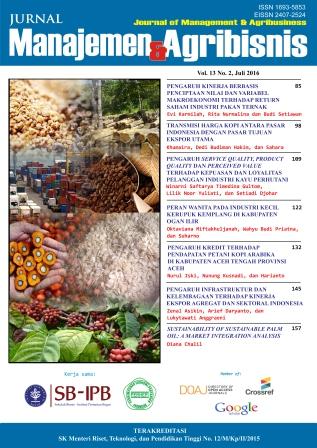PENGARUH KREDIT TERHADAP PENDAPATAN PETANI KOPI ARABIKA DI KABUPATEN ACEH TENGAH PROVINSI ACEH
Abstract
Agric finance is one of the important components in the development of coffee plant which is one of the main export commodities of Indonesia. This research aims to 1) identify the factors affecting credit access to formal sources of finance by the farmers, and 2) analyze the effects of credit on the farmer income. The study was conducted in the Arabica coffee production center at Aceh Tengah district. Data were collected from 73 farmers by the stratified random sampling. The data analysis was conducted using the probit model, and the results showed that the factors affecting farmers’ access to credit include age, dummy of creditor‘s visit and farmers' knowledge. Using simultaneous equation model (2SLS), the estimation results showed that credit has positively increased production and food consumption of organic Arabica coffee of the farmers. Correspondingly, the simulation results showed that the increase in production and consumption of food will increase the productivity of the labor in the family, and this is the dominant input in organic Arabica coffee farming that will increase the farmers' income.
Keywords: organic Arabica coffee, credit, simultaneous (2SLS), farmers’ income, probit
Keywords: organic Arabica coffee, credit, simultaneous (2SLS), farmers’ income, probit
Authors
IskiN., KusnadiN., & HariantoH. (2016). PENGARUH KREDIT TERHADAP PENDAPATAN PETANI KOPI ARABIKA DI KABUPATEN ACEH TENGAH PROVINSI ACEH. Jurnal Manajemen Dan Agribisnis, 13(2), 132. https://doi.org/10.17358/jma.13.2.132
Authors who publish with this journal agree to the following terms:
- Authors retain copyright and grant the journal right of first publication with the work simultaneously licensed under a Creative Commons Attribution License that allows others to share the work with an acknowledgement of the work's authorship and initial publication in this journal.
- Authors are able to enter into separate, additional contractual arrangements for the non-exclusive distribution of the journal's published version of the work (e.g., post it to an institutional repository or publish it in a book), with an acknowledgement of its initial publication in this journal.
- Authors are permitted and encouraged to post their work online (e.g., in institutional repositories or on their website) prior to and during the submission process, as it can lead to productive exchanges, as well as earlier and greater citation of published work (See The Effect of Open Access).

